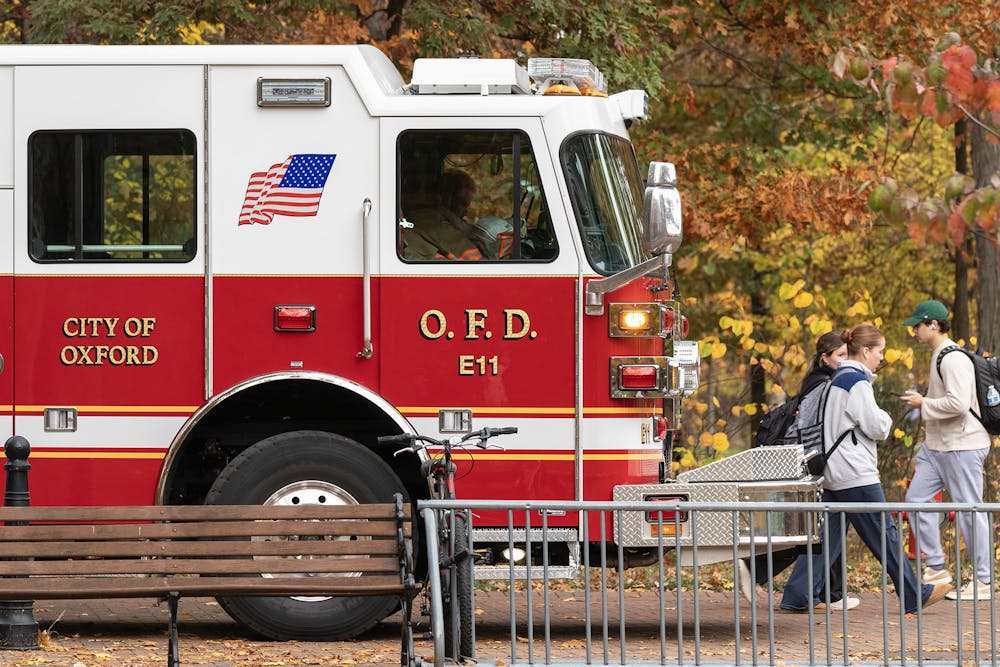Oxford Fire Department (OFD) struggles under the pressure of serving the townships of Oxford, Hanover and Riley and the more than 16,000 students enrolled at Miami University living in Oxford.
Facing financial deficit and staffing issues, Oxford is now considering where these deficits are coming from. The overwhelming response from Oxford community members is Miami.
“Everybody pays their fair share except for Miami, who uses [OFD] as a free service,” Oxford Mayor William Snavely said.
Dick Keebler, former OFD assistant fire chief retired in 2006, said one of the root causes for the financial crisis affecting OFD is that over 45% of Oxford properties do not pay property taxes. This leaves the burden of paying for these services on permanent Oxford residents and those paying an earnings tax within the city of Oxford, which includes Miami faculty and staff.
Oxford City Council determined early this year that 43% of all fire calls in Oxford are for students on Miami’s campus or within the Mile Square. According to the Journal-News’s report done in February 2023, 57% of those calls were false alarms.
According to Miami University Police Department records, so far during this academic year, OFD has been called to Miami’s campus 196 times, 84 of those calls for medical assistance and 112 for fire alarms.
During the 2022-2023 academic year, OFD was called to Miami’s campus a total of 443 times. Of those calls, 284 were made to the fire department, and 159 calls were made requesting emergency medical assistance.
Robert Abowitz, associate director of Resident Life, said the main causes of these false alarms were primarily in residence halls, where students would burn popcorn or mac and cheese in a microwave or spray an aerosol such as body spray, hair spray or air freshener.
“Generally speaking, I can say that almost all of the alarms are false alarms,” Abowitz wrote in an email to The Miami Student.
Keebler said during his time as fire chief, a main source of calls to the university were intoxicated students who would prompt unnecessary calls.
“It’s ridiculous some of the calls that they send the life squad on,” Keebler said. “In 2006, I had to get out of bed twice to go pick up drunk students. That was the last night I ran.”
The problem is only going to get worse with increasing calls, and something must be done by the university to compensate for the number of calls they produce, Snavely said.
Enjoy what you're reading?
Signup for our newsletter
“The firefighters and EMTs have been so overworked because they go to Miami for at least half of their runs, and at least half of those runs are false alarms,” Snavely said.
Snavely and Keebler both believe Miami should pay for their share of calls made to OFD.
“In 1993, we badly needed a new fire truck, and the city went to the university for help and they did,” Keebler said. “And ever since 1993, the university has paid one-third of the price of every ambulance and fire truck that has been purchased since then, even though they don't have to.”
However, that is not how representatives at Miami see the situation. David Creamer, senior vice president of finance and business services at Miami, said the number of calls to Miami, while they are numerous, end up being extremely brief.
“There is not really any real activity, which is one of the things I think [the city of Oxford] misrepresented,” Creamer said. “For the most part, they're not spending significant amounts of time here, and they’re not adding staff to do that.”
Keebler and Creamer both said OFD wouldn’t have the funds to operate if it weren’t for the number of employees who pay the city income tax.
“The university does make the most significant contributions to the fire department,” Creamer said. “One-quarter percent of the income tax goes towards a special fund that funds the fire department.”
According to Creamer, 52% of all income tax comes from the university, indirectly or directly. This is from professors, faculty, staff, student employees, etc.
For this reason, Creamer said that the students of Miami shouldn't have to pay for fire and EMS services when Miami is already such a large contributor.
“I don't see why this should be fully borne by our students,” Creamer said.
The city of Oxford is looking to charge Miami university students, in total, $1 million for their use of fire and EMS services. This would break down to around $60 per student. However, this fee is not plausible to add mid academic year because of Miami’s tuition guarantee, Creamer said.
Various solutions are being discussed to raise more money for the fire department, including applying for grants, increasing property tax revenue, proposing a levy or pushing Miami to pay for its share of usage. Assistant city manager Jessica Greene said these solutions are far from being officially proposed.
“It would be irresponsible to start talking about solutions before we really understand the full nature of the problem,” Greene said.
She gave no further comments regarding the possible solutions discussed by the mayor.
Greene said Oxford is in the research phase of understanding the root cause of this financial issue. City council met for an executive session on Nov. 7, where officials explained what they think is the cause of the problem and the level of deficit per year.
Despite no official discussion being had on possible solutions, Snavely believes there is only one true solution to this fiscal problem.
“I just hope that the university makes the right choice because it is a critical situation,” Snavely said. “We are in a crisis and they need to recognize that.”
OFD declined to comment on the current financial deficit and issued an official statement.
“The Local is working in concert with the city administration,” the statement reads, “to identify and implement solutions for the current staffing shortfalls and to meet the future needs of our community.”




